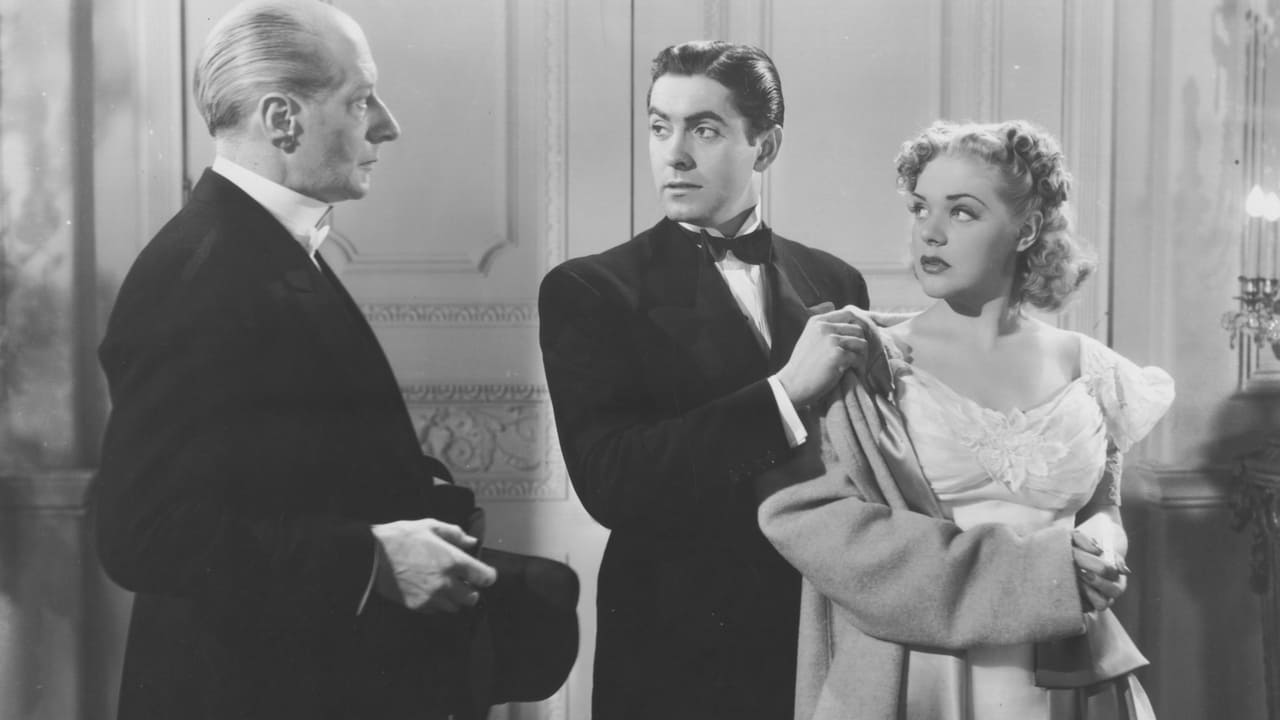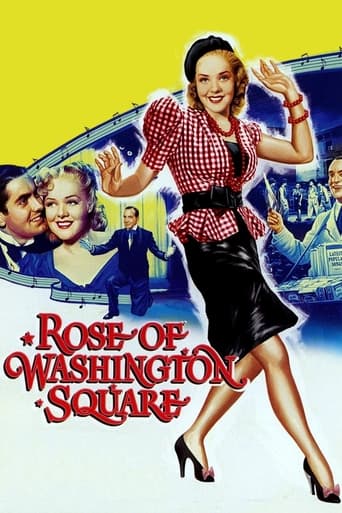

'Rose of Washington Square' is notable for being the third, and last, film with Tyrone Power and Alice Faye starring together. The previous two being 'In Old Chicago' and 'Alexander's Ragtime Band'.Comparing the three, 'Rose of Washington Square' is better than 'In Old Chicago', which had a number of impressive elements but generally left me lukewarm, but is not as good as 'Alexander's Ragtime Band', which is not perfect but a must watch for particularly Irving Berlin's glorious songs.Oddly enough, 'Rose of Washington Square' is just as notable for being a loose and thinly disguised biopic of Fanny Brice and for being a vehicle for Faye and Al Jolson. Generally, while it is never going to be one of my favourites, it's good fun.The story is very flimsy, and sometimes with Jolson's involvement it does disconcertingly at times feel like two different films. The characterisations are often undercooked, Power's character in particular is so severely underwritten that it was amazing that he was even able to get anything out of it. Power does have a roguish charm and has good chemistry with Faye, but due to his character and how he's written he's also a little bland compared to everything else. The direction by Gregory Ratoff does sometimes lack the necessary zip and is a bit too staid in places.However, 'Rose of Washington Square' is an attractive-looking film, with lavish set and costume design and beautifully shot in black and white. The music is similarly terrific, Faye and Jolson getting the lion's share. Faye sings beautifully and with heartfelt emotion and enthusiasm in her numbers, of which "My Man" is the most memorable, but Jolson's songs (some of which are among his biggest hits) make even more impact.The script is sweet and humorous, and there is a great vaudeville atmosphere throughout and scenes do have a nice energy especially Jolson's. Although there are reservations about Power, the rest of the cast do very well. Faye is luminous and sings a dream, singing every song like she knows what she's singing about and means it. Jolson is electrifying, with the film coming to life in his musical numbers. Entertaining support from William Frawley and Hobart Cavanaugh, Ben Weldan and Louis Prima are also fun to spot.In summary, good fun if not great. 7/10 Bethany Cox
... View MoreEntertainment careers, romance, and petty crime mix together to create a reasonably good film, based on the real life story of Ziegfeld star Fanny Brice and her attraction to gambler Nicky Arnstein. The script changes the names, and the two leads become Rose (Alice Faye) and Bart (Tyrone Power). "Rose Of Washington Square" is a thin story connected by numerous musical numbers.The film has the look and feel of a long-ago era, specifically Vaudeville, with its eclectic mix of self-contained acts: singing, dancing, magic, and comedy. One lengthy segment features Rose singing in Washington Square, but interrupted by an unrelated act called "Igor and Tanya", an acrobatic performance not connected to anything else in the film. And then there's the stage performance wherein Rose and various dancers perform a dance that includes a magic act. As the dancing proceeds, each person brings forth a lit cigarette out of thin air, smokes it, then fetches another cigarette from out of nowhere.This tribute to Vaudeville goes into overdrive with the appearance of entertainer Al Jolson, as character Ted Cotter. This character has little or nothing to do with Fanny Brice. I think the reason he's in the script is that he represents Brice's historical era. Jolson's inclusion ignites the plot, generating real pizazz into an otherwise lazy, dreary story. All bug-eyed and in black-face, and wearing white gloves, Jolson electrifies at the plush Winter Garden Theater, with his standard songs: "Rock-A-Bye Your Baby", "My Mammy", and "California, Here I Come".Casting is mixed. Tyrone Power is surprisingly good. And I enjoyed William Frawley as a talent agent. But glamorous Alice Faye is not convincing as a stand-in for Brice. Faye does sing quite well, but I didn't care for any of her songs, with the exception of "My Man", Brice's signature number.Costumes, hairdos, and prod design all seem to reflect well the early twentieth century era. B&W cinematography, sound effects, and editing are all competent, and pleasantly unobtrusive.Without Jolson, the film would be average at best. But Jolson alone ups the entertainment value several notches, and that Vaudeville atmosphere is wonderfully nostalgic.
... View MoreThe title refers to Alice Faye as Rose of Washington Square, in this film that is loosely based on the life of Fanny Brice. You may not recognize it or realize that, if you didn't see "Funny Girl" just prior to it or knew certain facts about her and Nick Arnstein. But, Fanny and Nick filed a lawsuit against the movie, because songs that were included would have made it obvious to the current moviegoers just who it was all about. So, the executives had to edit or take out songs which were too closely identified with Fanny Brice. But, the film stands on its own merits without knowing anything about them. Alice Faye may be the star (and she has some good songs, too), but it's Al Jolson that almost outshines her with some great show-stopping numbers: "Rock-a-Bye Your Baby with Dixie Melody" and "California, Here I Come."The only qualm I have is that, the song "Rose of Washington Square" that is sung here doesn't have the same verses that singer Ann Dee sings in "Thoroughly Modern Millie." It is the same song; that I know. The different movies just decided to sing different verses of it. I personally like the slow presentation in "Millie", where Ann Dee is sitting on top of a piano in the smoke-filled room in "Thoroughly Modern Millie". If only a movie had the song in its entirety for posterity. That notwithstanding, this movie is out on an Alice Faye DVD collection (the edited version), so it has a chance of being discovered, which is good, because the music is too good to be buried away somewhere.
... View MoreDespite this disclaimer at the beginning of "Rose of Washington Square," Fanny Brice realized the film was about her and quickly sued 20th Century Fox. Gee, wonder what the kicker was...the good-looking con man husband who goes to jail on a bond fraud? The lead character headlining with the Ziegfield Follies? Or was it the song "My Man"? Alice Faye is very pretty as Rose in this somewhat politically incorrect film which also stars Tyrone Power and Al Jolson: There's the man who is paid to drink so he can heckle Al Jolson as part of his act, and there's Al himself in blackface with white lips up on stage singing. Nevertheless, the real story concerns the codependent relationship between Rose and Bart, her crooked husband. But it's Tyrone Power, and what woman wouldn't have loved him - in fact, what woman didn't love him in 1939? He was the number 2 box office star. He portrays the likable but sleazy character very well. In the beginning of his career a few years earlier, he did romantic comedy, then did a string of films where he was a cad, then played soldiers, and after the war, did everything - he was a young man who found himself in "The Razor's Edge," played against type in "Nightmare Alley," and period-pieced his way through Fox until his contract finally ended. In 22 years as a star, he really did every genre, and did them beautifully.There's lots of music in this movie and a HUGE build-up to the song "My Man" before Faye ever sings it. When she does, it's not the Streisand version, but rather a torch song, sung in Faye's low, rich voice. Jolson was a terrific performer though apparently extremely egomaniacal and difficult to work with. He sings his standards: "Mammy," "California Here I Come," "Toot-toot-Tootsie," "Rockabye Your Baby," etc., and he's great. Power and Faye make a wonderful couple. And by the way, they shared the same birthday, a year apart.This is an okay film, but it's no Alexander's Ragtime Band, which is far superior.
... View More